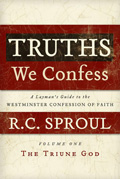
R. C. Sproul
Reviewed by: G. I. Williamson
Truths We Confess, A Layman's Guide to the Westminster Confession of Faith, Vol. 1, by R.C. Sproul. Published by P&R Publishing, 2006. Hardback, 279 pages, list price $22.00. Reviewed by OP minister G. I. Williamson.
Feast or famine? These two terms sum up my own experience with commentaries on the Westminster Confession of Faith, only in reverse order. When I found A. A. Hodge's commentary, it had long been out of print, and I could find nothing else of the sort. That's why I began writing material on the Confession. So that was a time of famine. But now, fifty years later, several new commentaries have appeared, and this may well be the best. It is easy to read, crystal clear, and faithful to the text.
This volume covers only the first eight chapters of the Confession (two more volumes are to follow), but it covers them well. In doing so, it shows two things in a convincing way. The first is how little room there is for anyone who submits to Scripture to disagree with the Confession. I noticed only one example: the use of the word immortal as an attribute of the human soul (p. 134). I think Sproul is right in suggesting that the Westminster divines meant to say only that people will have conscious existence forever. But since the Bible says that God alone has inherent immortality (1 Tim. 6-16), his concern is well taken. The second thing this study shows is how adequate the Confession still is for today.
Sproul takes each phrase of the Confession and expounds and expands upon it. The result is a composite exposition drawn from Scripture, church history, years of teaching experience, and lively interaction with the errors of our time. For example, the chapter on the doctrine of God provides a powerful answer to the error called open theism.
I find it encouraging that Sproul affirms a literal six-day creation and now rejects framework hypothesis. He argues correctly that the Confession "makes it a point of faith that God created the world in the space of six days." He doesn't think that some views current today can be reconciled with this language, and he considers this a "crisis" (p. 120). Even those who disagree with him will be challenged by this chapter.
The chapter on providence is superb. Let me quote a few statements to whet your appetite: "It is good that there is evil. If it were not good, then God would be sinful in even allowing for its possible existence." Again, "If Adam and Eve could not sin apart from divine providence, and if they did sin under that providence, we must conclude that in one sense it is good that they sinned." Such statements, standing alone, certainly startle us. But in the context of this rich chapter we are edified by them.
It is my hope that the next two volumes will be as excellent as this one. This, for me, was nothing less than a long-awaited feast! Highly recommended.
December 14, 2025
December 07, 2025
November 30, 2025
November 23, 2025
November 16, 2025
November 09, 2025
November 02, 2025
© 2025 The Orthodox Presbyterian Church